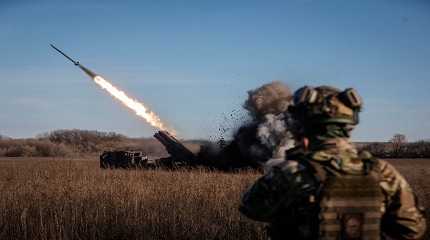
KYIV, Dec 1 (Reuters) - Ukraine's military said on Thursday Russia had pulled some troops from towns on the opposite bank of the Dnipro River from Kherson city, the first official Ukrainian report of a Russian withdrawal on what is now the main front line in the south.
The statement gave only limited details and made no mention of any Ukrainian forces having crossed the Dnipro. Ukrainian officials also stressed that Russia had intensified shelling across the river, knocking out power again in Kherson where electricity had only begun to be restored nearly three weeks after Russian troops vacated the city and fled across the river.
Since Russia abandoned Kherson last month, nine months into its invasion of Ukraine, the river now forms the entire southern stretch of the front.
Russia has already told civilians to leave towns within 15 km of the river and withdrawn its civilian administration from the city of Nova Kakhovka on the bank. Ukrainian officials have previously said Russia pulled back some artillery near the river to safer positions further away, but until now had stopped short of saying Russian forces were quitting towns.
"A decrease in the number of Russian soldiers and military equipment is observed in the settlement of Oleshky," the military said, referring to the town opposite Kherson city, on the far side of a destroyed bridge over the Dnipro.
"Enemy troops were withdrawn from certain settlements of the Kherson oblast and dispersed in forest strips along the section of the Oleshky - Hola Prystan highway," it said, referring to a 25-km (15-mile) stretch of road through riverside towns scattered in woods on the bank opposite Kherson city.
It said most of the Russian troops in the area are recently mobilised reservists, suggesting that Moscow's best-trained professional troops had already left.
Reuters could not independently confirm the report.
Separately, Ukraine tightened security at its diplomatic missions around the world on Thursday after a mail bomb exploded at its embassy in Madrid, one of several devices sent to targets in Spain, including to Prime Minister Pedro Sanchez.
Ambassador Serhii Pohoreltsev told the Ukrainian news site European Pravda that the suspicious package addressed to him had been opened outside the building by the embassy's Ukrainian commandant, who was injured in the blast.
"After opening the box and hearing a click that followed, he tossed it and then heard the explosion," he said. "Despite not holding the box at the time of the explosion, the commandant hurt his hands and received a concussion."
New air raid sirens wailed again across Ukraine on Thursday and residents took to shelters, but there were no immediate reports of major missile strikes and the warning was lifted.
Since early October, Russia has also launched near weekly massive missile and drone attacks across Ukraine to knock out its power supply, water and heat, which Kyiv and the West say is intended to harm civilians, a war crime.
The last huge volley of strikes last week knocked out heat and power for millions, and President Volodymyr Zelenskiy has warned Ukrainians to expect another wave soon.
Russian Foreign Minister Sergei Lavrov defended those strikes on Thursday, saying Moscow was targeting Ukraine's civil infrastructure to prevent Kyiv from importing Western arms. He did not explain how such attacks could achieve that aim.
"We disable energy facilities (in Ukraine) that allow you (the West) to pump lethal weapons into Ukraine to kill Russians," Lavrov said.
Kyiv said on Thursday recent volleys had included dud Russian missiles capable of carrying nuclear warheads, fired with no payload apparently to distract Ukrainian air defences.
BATTLEGROUND
The Ukraine war is entering a relentless new phase with the onset of the first winter since Russia's Feb. 24 invasion.
After pulling back in the south in November, Moscow has focused its firepower on a section of the front line in the east near the city of Bakhmut, where hundreds of soldiers are thought to be dying each day in fighting in cold and muddy trenches, yielding scant reported gains of territory on either side.
Ukraine's armed forces reported heavy shelling of a number of frontline villages in the area.
Russia's defence ministry said Ukraine had handed over 50 prisoners in the latest exchange between the two countries. Moscow is expected to release a similar number.
There are no political talks under way to end the war, which Russia launched as a "special military operation" claiming its aim was to disarm its neighbour and root out leaders it characterises as dangerous nationalists. Kyiv and the West call it an imperialist land grab. The war has killed tens of thousands of Ukrainian civilians and soldiers on both sides.
The European Union called this week for a special tribunal to prosecute Russian officials accused of aggression, the war crime of attacking another state without justification.
"As for attempts to establish some kind of tribunal: they will have no legitimacy, will not be accepted by us and we will condemn them," Kremlin spokesman Dmitry Peskov said in a briefing call with reporters on Thursday.
Ukraine's nuclear power company said it had sacked a senior engineer at the Zaporizhzhia nuclear power plant for collaborating with Russia, a day after Moscow said the engineer, Yuriy Chernichuk, was promoted to become the plant's new boss.
In October, Russia said it was taking control of the plant, which is located in Russian-held territory along the Dnipro but still operated by Ukrainian engineers. Kyiv says the plant still belongs to Ukraine and Russia's seizure is illegal.




